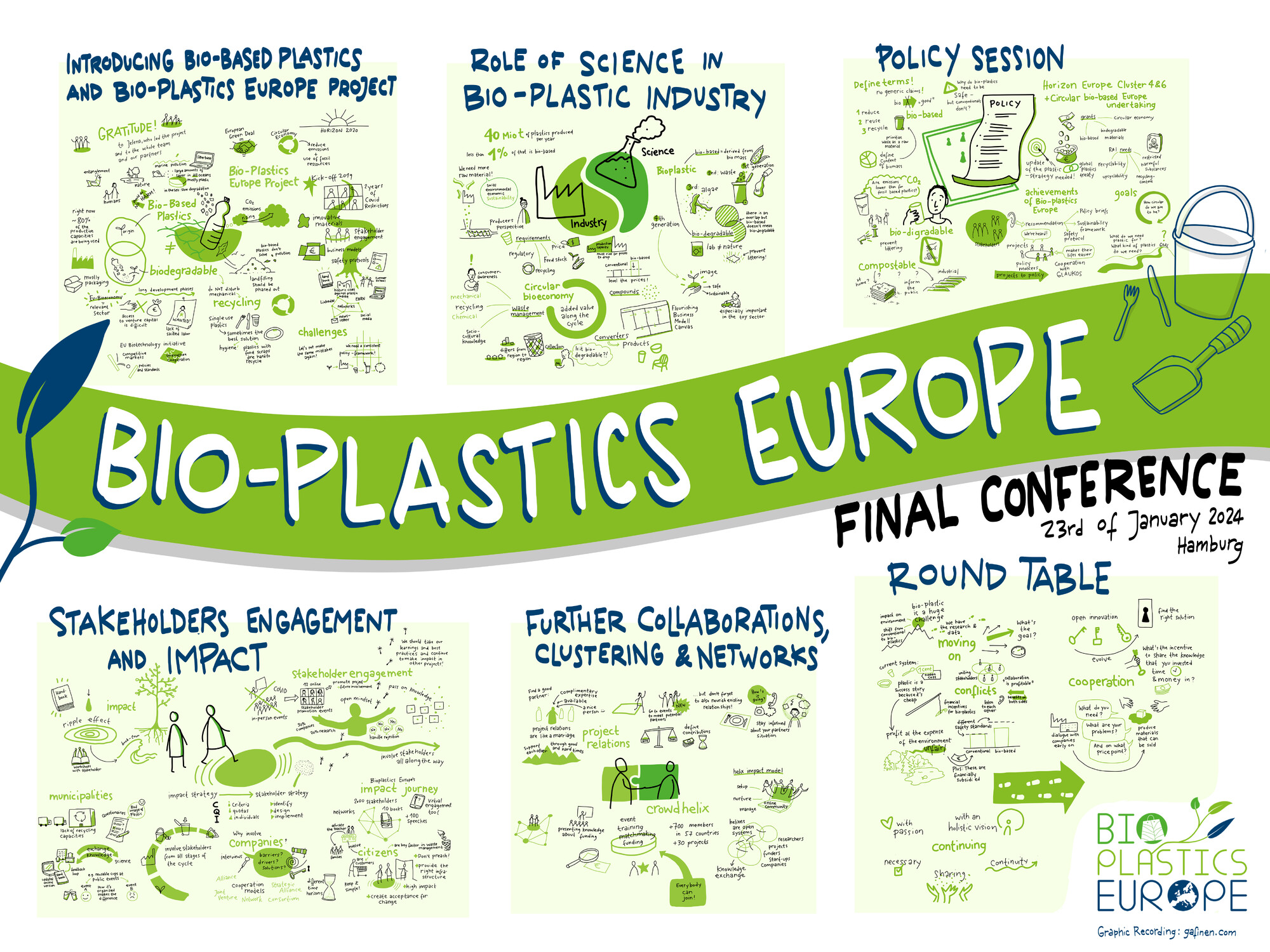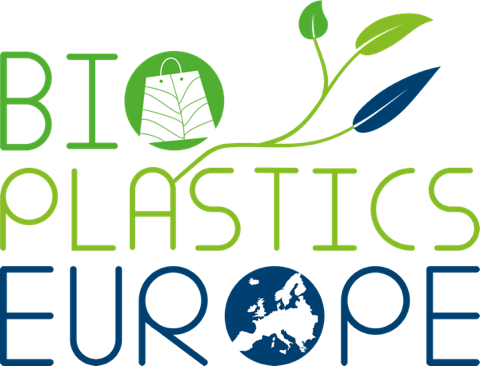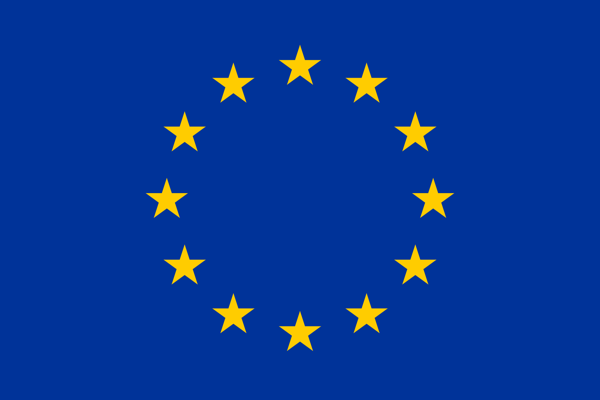The BIO-PLASTICS EUROPE Final Conference
After over 4 years of project work, BIO-PLASTICS EUROPE concluded on 23rd January 2024 with the final conference, an event that brought project partners, stakeholders and various guests together for a final time to celebrate the project’s success and discuss its outcomes.

The final conference took place in the Hotel Hafen Hamburg, a central venue within the city of Hamburg, on the 23rd of January 2024, and was coordinated by Hamburg University of Applied Sciences (HAW) and supported by Prospex Institute (PI). Five different sessions offered in-depth insights into the various perspectives on biobased and biodegradable plastics, as well as the most valuable learnings from the four-year project journey, guiding along the value chain of biobased and biodegradable plastics. Each session was followed by a panel discussion, delving deeper into each topic with the respective speakers. A graphical illustrator captured the key messages from each session as the conference progressed.
The first session of the day was labelled “Introducing bio-based plastics and BIO-PLASTICS EUROPE project”, which was moderated by Prof. Dr. Zaneta Stasiskiene (KTU).
The project coordinator, Prof. Dr. Walter Leal Filho (HAW), opened the conference, welcomed the audience, and highlighted the importance of teamwork and international cooperation that were contributing to the success of the BPE project. The opening was followed by the welcome speech of the REA EU Officer Dr. Edvokia Achilleos, who reinforced the significance of the project within the EU strategies and EU Green Deal. She also emphasised the role of bio-based plastics in innovation and research, as well as the potential of the BPE project for the addressment of environmental issues that are putting pressure on the ecosystem. Dr. Lars Gutow (AWI) introduced said environmental issues by discussing the distribution and impact of plastics in oceans. Building on that, Hasso von Pogrell (European Bioplastics e.V.) provided an overview of bioplastics development in Europe and providing insights into the market opportunities and global production capacities in the bioplastics sector. Dr. André Wolf (CEP) expanded the economic perspective that Mr. von Pogrell analyzed further in his presentation, by exploring the challenges and potentials found within bio-based value chains and discussing the EU Biotechnology initiatives' implications for bio-based plastics. Lastly, Dr. Jelena Barbir (HAW) closed session one by highlighting the collaborative efforts that contributed to the success of the project, she underscored the projects alignment with circular economy principles and presented significant outcomes and impacts achieved.
Session two was labelled “The role of science in bioplastics industry” and was moderated by Carolyn Brand (PI). Here, one of the companies included in the BPE project, Arctic Biomaterials, opened the session through Dr. Ari Rosling. He addressed the importance of bioplastics in product development, emphasizing the challenges faced by polymer and additive producers in the industry. He also emphasized the inevitable transition towards a bio-based future and the associated obstacles. Dr. Emma Strömberg (IVL) followed his presentation by showcasing the scientists’ perspective. She presented statistics and current scenarios in biodegradable plastics. Furthermore, she highlighted the life cycle perspective in the assessment of overall sustainability. Dr. Eleonora Foschi (UNIBO) added another perspective onto the session, by discussing the contribution of biobased and biodegradable plastics to the circular bioeconomy. Prof. Dr. Zaneta Stasiskiene (KTU) closed the session with a presentation on the waste management viewpoint, and the needs by the industry when dealing with biobased and biodegradable plastics.
Session three focused on the policy regarding biobased and biodegradable plastics, moderated by Emma Strömberg (IVL). The session featured two virtual presentations from two EU Policy Officers. Dr. Paola Migliorini (EU Policy Officer) opened the session by talking about a European policy framework for bio-based, biodegradable and compostable plastics. She discussed the policy framework in the context of the European Green Deal. Moreover, she highlighted the environmental benefits and challenges of bio-based plastics, as well as addressing the political context and future directions in policy development. Building on that, Dr. Silvia Maltagliati (EU Policy Officer) presented the Horizon Europe R&I Programming on bio-based and biodegradable plastics. There, she gave an overview of research and innovation programs in bio-based plastics, as well as an explanation of the links to policy development with research initiatives and industry perspectives. The session then moved on to Dr. Jelena Barbir (HAW). She presented the BIO-PLASTICS EUROPE Projects2Policy Concept for policy support, thus highlighting the importance of a holistic approach and collaborative efforts. Dr. Andrew Farmer (Institute for European Environmental Policy), closed the session three, by presenting policy conclusions from the SEALIVE project. He explored various aspects of sustainable sourcing and composting. Additionally, he discussed the appropriate use of biodegradable plastics and addressed the need for responsive policies in the changing environmental landscape.
The fourth session put the stakeholder engagement and impact in the spotlight and was moderated by Angela Hahn (PI). Carolyn Brand (PI) took the stage to illustrate the impactful journey of BPE. She navigated through the intricate terrain of defining impact and underscored the criticality of formulating an impact strategy as a linchpin for the overarching stakeholder strategy. Dr. Jelena Barbir (HAW) delivered invaluable insights emphasizing the project's dedication to continuous improvement. Her focus on learning from past experiences, building capacities, and fostering effective knowledge sharing showcased the project's commitment to collaboration, and transparency in stakeholder engagement. Additionally, she advocated a culture of collaboration, communication and inclusivity in the stakeholder network which underscored the project's commitment to evolution and a resilient ecosystem. Prof. Dr. Angelo Paletta (UNIBO) contributed valuable insights from the industry perspective, delving into the intricate business and managerial aspects of bio-based plastics. Employing a mixed-methods approach, he provided a holistic understanding of industry perspectives, exploring challenges, opportunities, and trends. In addressing the municipalities' perspective, Prof. Dr. Zaneta Stasiskiene (KTU) adeptly navigated the challenges presented by EU regulations on plastics waste management. Her discussion centered on the bio-circular green economy model, where she emphasized the pivotal role of public events in promoting awareness and catalyzing impactful change.
The last session, on further collaborations, clustering, and networks, was moderated by Carolyn Brand (PI). Here, Prof. Dr. Walter Leal (HAW), discussed the importance of networking and establishing collaborations, specifically the necessity for mutual appreciation and understanding in partnerships. His presentation was followed by Dr. Valeria Pulieri (Crowdhelix), presenting the crowdhelix methodology for clustering, knowledge sharing and open innovation. Dr. Valeria Pulieri highlighted the importance of community building and intellectual property management.
The conference concluded with an impactful roundtable, moderated by Carolyn Brand (PI), featuring distinguished participants: Vo Quoc Thao Nguyen (International Sustainability Academy), Simon Gölden (Fraunhofer LBF), Miriam Gallur (ITENE), Prof. Dr. Walter Leal (HAW), Valeria Pulieri (Crowdhelix), and Hasso von Pogrell (European Bioplastics e. V.).
The central theme of collaboration took precedence during the roundtable, highlighting the imperative need for global, systemic initiatives in the bioplastics industry. Discussion points encompassed addressing conflicts in the value chain, understanding incentives, recognizing consumer perspectives, and strategizing to cultivate mutually beneficial relationships for driving innovation. The roundtable served as a dynamic platform for thought leaders to delve into critical aspects of collaborative efforts, contributing to a shared vision for the future of the bioplastics sector.
The final conference of the BPE project served as a closing event after four years of project work. It highlighted the main outcomes and most important take-aways of the project and offered an opportunity to share these with relevant stakeholders and collaboration partners, whilst facilitating their uptake and the formation of new possible collaborations. The five sessions covering the main areas of the project offered a variety of insights into the project journey, best practices and results and each led to lively discussions both during the panel discussions and roundtable and also during breaks. Overall, the final conference was a successful conclusion to the project’s journey.

